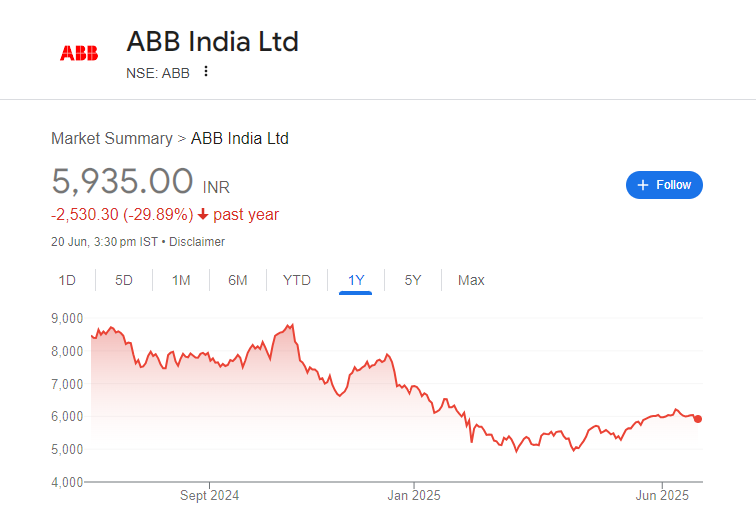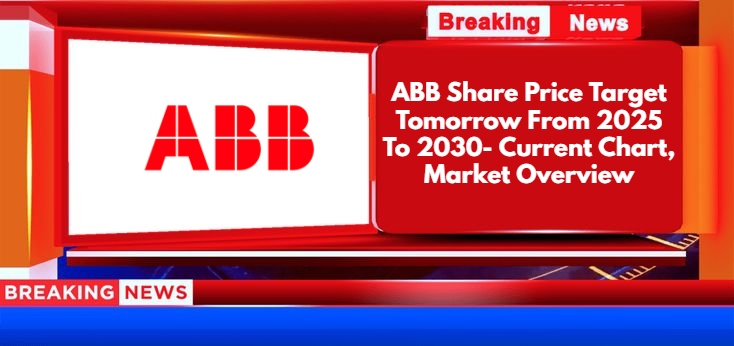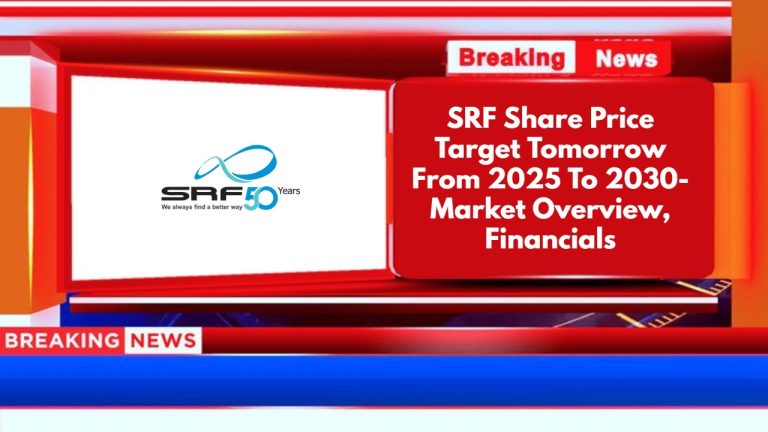ABB Share Price Target Tomorrow From 2025 To 2030- Current Chart, Market Overview
ABB India is a trusted name in the field of engineering and automation, known for its smart and energy-efficient solutions. The company plays a key role in making industries more productive and helping India grow with advanced technologies in robotics, electrification, and digital automation. Customers and partners feel confident with ABB’s reliable products, strong service support, and commitment to innovation. ABB Share Price on NSE as of 23 June 2025 is 5,935.00 INR. This article will provide more details on ABB Share Price Target 2025, 2026 to 2030.
ABB India Ltd: Company Info
- Headquarters: India
- Number of employees: 3,625 (2025)
- Parent organization: ABB Asea Brown Boveri
- Subsidiaries: Turbocharging Industries And Services India Private Limited.
ABB Share Price Chart

ABB Share: Market Overview
- Open: 5,897.00
- High: 5,991.00
- Low: 5,853.50
- Mkt cap: 1.26LCr
- P/E ratio: 66.65
- Div yield: 0.40%
- 52-wk high: 8,940.60
- 52-wk low: 4,684.45
ABB Share Price Target Tomorrow From 2025 To 2030
Here are the estimated share prices of ABB for the upcoming years, based solely on market valuation, enterprise trends and professional predictions.
- 2025 – ₹8950
- 2026 – ₹9400
- 2027 – ₹9830
- 2028 – ₹10,360
- 2029 – ₹10,640
- 2030 – ₹10,080
ABB Share Price Target 2025
ABB share price target 2025 Expected target could be between ₹8900 to ₹8950. Here are 7 key factors that could influence ABB Ltd. (ABB India) and its share price growth through 2025:
1. Strong Order Backlog & Revenue Growth
ABB India’s order backlog has grown ~12% YoY, reaching around ₹9,958 cr by Q1 2025, while revenue rose ~22% in Q4 FY 24, showing strong demand across divisions.
2. High-Profit Margins & Operational Efficiency
The company has achieved record-high operating margins (~20.6%) and improved cash reserves (~14%), reflecting disciplined cost control, premium pricing, and local manufacturing.
3. Leadership in Electrification & Automation
ABB India leads markets like low-voltage motors, drives, EV charging, and smart grid solutions—capitalizing on India’s push in energy transition, infrastructure, and EV adoption.
4. Growth in Robotics and Digital Solutions
The Robotics & Discrete Automation division is the fastest-growing. ABB’s AI-powered platform, ABB Ability, and expansion of smart-labelling across plants support future automation trends.
5. Export Potential & Localisation Strategy
Exports account for ~10–15% of ABB India’s revenue. Increasing investment from Swiss parent ABB—boosted by the upcoming India–EFTA trade pact—will expand India as a manufacturing and export hub.
6. Sustainability & ESG Leadership
ABB India has reduced greenhouse gas emissions by ~86% since 2019, with zero-waste certifications and strong ESG initiatives—appealing to both customers and investors.
7. Financial Strength & Capital Allocation
With robust cash reserves (₹5,756 cr in Q1), a rising dividend payout (up ~51%), and focus on organic/inorganic growth, ABB India is well-capitalized for capex and strategic acquisitions. At the global level, ABB targets 5–7% annual growth .
ABB Share Price Target 2030
ABB share price target 2030 Expected target could be between ₹10,000 to ₹10,080. Here are 7 key risks and challenges that could impact ABB Ltd. (ABB India) and its share price outlook by 2030:
-
Cyclicality in Capital Spending
ABB’s revenues depend heavily on industrial and infrastructure investments. Economic slowdowns or reduced capex from government/private sectors could hurt order inflows and revenue growth. -
Intense Competition in Automation
ABB faces strong competition from firms like Siemens, Schneider Electric, L&T, and global players. Aggressive pricing or loss of technological edge could erode margins and market share. -
Raw Material & Supply Chain Risks
Volatility in copper, steel, semiconductors, and logistics costs can squeeze margins—especially given past supply disruptions tied to global events. -
Project Delays & Order Execution Issues
Delivering large projects on time and on budget remains a challenge. Slower execution can affect revenue recognition, cash flow, and investor sentiment. -
Regulatory & Compliance Threats
ABB India has faced insider trading scrutiny and EU regulatory probes. Compliance failures or policy changes could lead to fines, reputational damage, and tighter regulations. -
Cybersecurity Vulnerabilities
Critical control systems from ABB (e.g., RMC-100) have been flagged in U.S. advisories. Cyber attacks on industrial infrastructure could pose significant operational and reputational risks. -
Foreign Exchange & Geopolitical Exposure
With ~10–15% of revenues from exports, ABB India is vulnerable to currency fluctuations, global trade restrictions, and geopolitical tensions—risks that can hit pricing and margins.
Shareholding Pattern For ABB Share
| Held By | May 2025 |
| Promoters | 75% |
| Flls | 10.28% |
| Dlls | 7.02% |
| Public | 7.7% |
ABB Financials
| (INR) | 2024 | Y/Y change |
| Revenue | 121.88B | 16.67% |
| Operating expense | 29.05B | 21.70% |
| Net income | 18.72B | 50.69% |
| Net profit margin | 15.36 | 29.18% |
| Earnings per share | 88.46 | 50.19% |
| EBITDA | 22.55B | 49.56% |
| Effective tax rate | 25.41% | — |
Read Also:- Belrise Industries Share Price Target Tomorrow From 2025 To 2030- Current Chart, Financials







